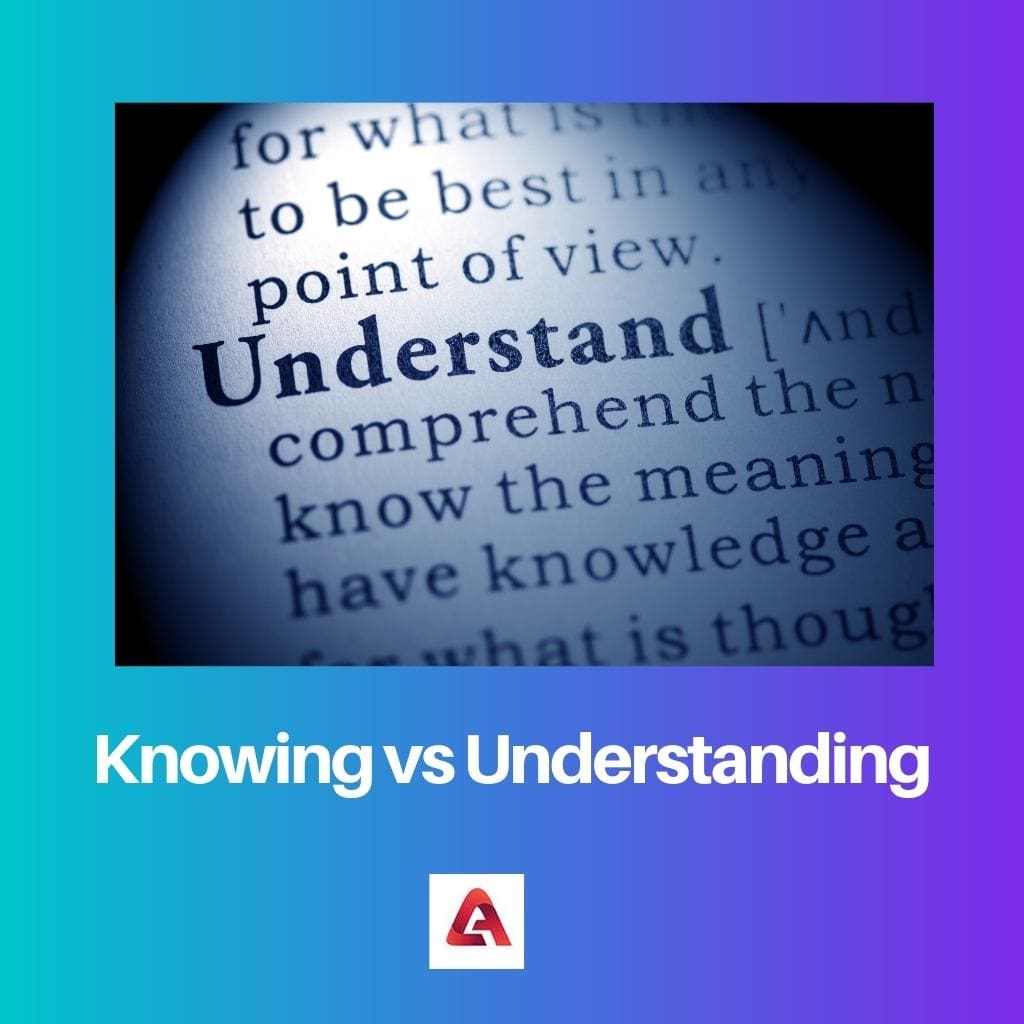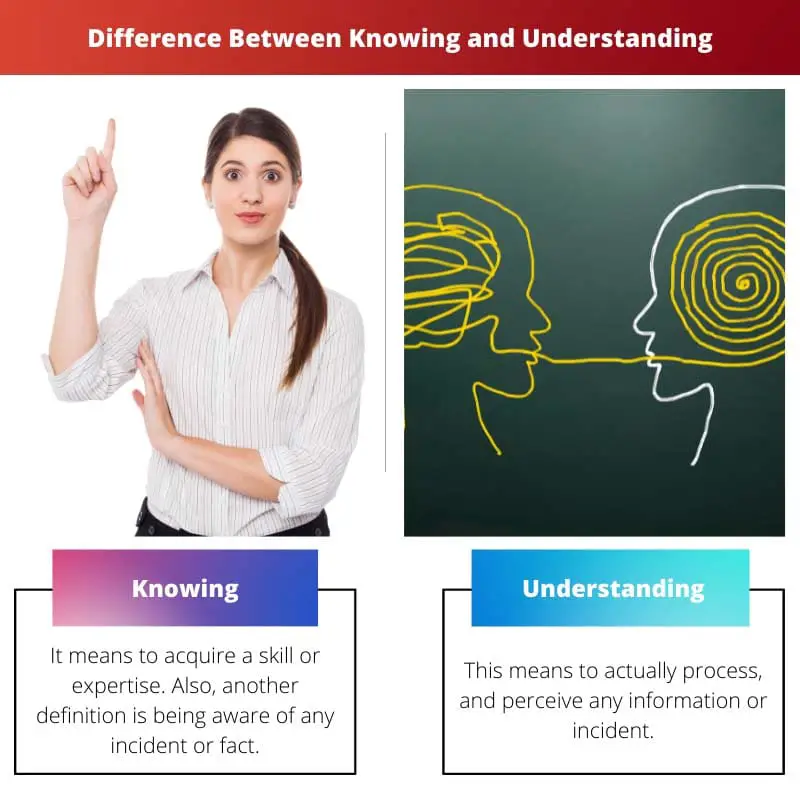English is one of the most widely spoken and advanced languages in the world right now. However, there are some issues with how we perceive and use some English words.
Acquiring knowledge is surely an active process; one would need to not just learn about any fact, they would have to process it and realize the knowledge they gained.
Acquiring knowledge is not a time-bound process; from the moment we wake up in the morning, we learn and know things around us, our experiences, incidents, and of course, the academic knowledge we gain all make us better people morally, intellectually, and psychologically.
Key Takeaways
- Knowing refers to having information or knowledge about something, while understanding refers to comprehending the meaning or significance of that information.
- Knowing can be memorising or recognising facts, while understanding requires critical thinking and analysis.
- Knowing is necessary for understanding, but understanding requires deeper insight and application.
Knowing vs. Understanding
Knowing refers to having information or facts, it is about being aware of something through observation, inquiry, or information. Understanding involves comprehension and the ability to make connections between different pieces of information.

Comparison Table
| Parameters of comparison | Knowing | Understanding |
|---|---|---|
| Definition | It means to acquire a skill or expertise. Also another definition is being aware of any incident or fact. | This means to process and perceive any information or incident. |
| Time | It takes lesser time. | It takes a longer time. |
| Level of depth | It is more superficial. | It takes a lot of time to process this at a deeper level. |
| Mechanism of processing | One does not need to use their brain to actively absorb this information or incidents. | One needs to use their brain to process and perceive information actively. |
What is “Knowing”?
Knowing can be used as an adjective and a noun; as an adjective, it means being aware of any information, incident, fact, or someone doing a deed in full consciousness. As a noun, it means to be aware or informed; for example, he knows about corporate jargon. It can also be used as a verb.
Knowing or the “act of knowing,” which is known as knowledge, also means acquiring a skill or expertise which they can use or apply later. For example, one may know how to change a light bulb, build a bed, and so on, but one may not know the explanation or reason behind it.
It is thus a superficial method of attaining knowledge wherein the person may not actively use their brain to process and perceive the information they or attained.
According to some articles, there are four major levels of gaining knowledge, and knowledge is just the first part of a long process. This makes it crucial, too; one should never stop learning anything only after knowing about that; it worsens the situation.
Benjamin Bloom was a researcher and professor in the field of education, and he established Bloom’s taxonomy for the different levels of understanding. The first part is “Knowledge,” to recall the data or information and other learned material. The second tier is “comprehension,” which means understanding, explaining, and grasping the basic information collected.

What is “Understanding”?
Understanding is the next step after knowing a fact or incident; it is a psychological process. One must actively use their brain to process and perceive the idea or incident.
Thus it is a longer and deeper process than just knowing. It is an important and crucial point for learners and teachers alike to understand matters for later implementation and practical examples.
Benjamin Bloom was a researcher and professor in the field of education, and he established Bloom’s taxonomy for the different levels of understanding.
The first part is “Knowledge,” to recall the data or information and other learned material. The second tier is “comprehension,” which means understanding, explaining, and grasping the basic information collected.
The third tier is “application,” which is the ability to use and apply the information learned to a new unknown situation. The fourth tier is “Analysis,” which includes breaking apart the idea and information and distinguishing between fact and interference.
The fifth tier is Synthesis, which means stitching together cohesive ideas that can be implemented in real-life situations, followed by Evaluation.
Thus the comprehension level is the actual “understanding” part which means reading, understanding, and processing the information in various forms like descriptions, reports, tables, diagrams, directions, and so on.
Thus understanding is a more psychological process than knowing, and it takes more time and effort to understand a matter than to know it.
For example, one may know about the physics behind fluid flow, but it is more than just fluid flowing from one part to another. There are internal stats to it, like force, pressure, density and so on, which all require a deep understanding of the matter.

Main Differences Between Knowing and Understanding
- Knowing means being aware of any incident or information. For example, one may know about the stock market and various news.
- Understanding is the next step, meaning one can intellectually process the information they have just learned about. Following the same example, the experts understand the stock markets and even predict them.
- Knowing is more superficially, and one may not actively perceive the knowledge they just learned. Understanding is a deeper process; one must actively perceive the knowledge and use their brain to understand it.
- It takes more time to understand any information while just knowing about them.
- Understanding is a long process wherein knowing can be a part of it.
- Understanding a fact or information can be life-changing, while knowing may not be as impactful.

Reference:
- https://search.proquest.com/openview/5c49062868d7dc61e265db1757eebcce/1?pq-origsite=gscholar&cbl=27755
- https://www.jstor.org/stable/2252119

Understanding the importance of comprehension from an educational perspective is crucial, and this article effectively elaborates on the different levels of understanding outlined by Bloom’s taxonomy.
I couldn’t agree more. The emphasis on Bloom’s taxonomy and the process of comprehension is of great value, especially for educators and learners.
The article does an excellent job in distinguishing between knowing and understanding, emphasizing the psychological processes involved. This is an enlightening piece.
The detailed discussion regarding the levels of understanding outlined by Bloom’s taxonomy provides valuable insights into the educational significance of comprehension. This is a remarkable piece of literature.
Understanding the significant difference between knowing and understanding is pivotal for learners, and this article effectively highlights the depth and cognitive processing involved in comprehension.
This thought-provoking article effectively sheds light on the psychological depth associated with understanding. It emphasizes the significance of the comprehension level in acquiring knowledge.
This article provides an insightful comparison between knowing and understanding, highlighting the deep cognitive processes involved in understanding. It is essential to realize the significant knowledge gained by understanding an idea.
I completely agree with you. This article does a great job explaining the difference between knowledge and comprehension, and why understanding is more significant.
I found the examples and comparison table particularly helpful in clarifying the distinction between knowing and understanding. This is an exceptional piece of writing.
The comparison table and detailed explanation of ‘Knowing’ and ‘Understanding’ are effective in conveying the deeper insight involved in the process of understanding. This article provides an exceptional analysis.
The comparison made between knowing and understanding is both educational and enlightening. It emphasizes the need for active cognitive processing, which is crucial for gaining a deeper insight.
The distinction between knowing and understanding is conveyed with utmost clarity in this article. I appreciate the emphasis on the psychological processes involved in the two concepts.
The discussion of Bloom’s taxonomy and its relevance to the levels of understanding is an essential aspect of this article. Knowing and understanding are indeed key components of the learning process.